Domestic violence letter examples: Sometimes, homes are not safe because someone is being mean or harmful. When this happens, a letter can be written to tell others about the bad things happening. These letters are called domestic violence letters. They are very important to help the person being hurt get help and protection.
In this article, we will look at some domestic violence letter examples. These examples will show us what to write in the letter and how to tell others about the bad things in a clear way.
What is a Domestic Violence Letter?
A Domestic Violence Letter is a document that talks about harmful actions happening at home.
The Benefits of a Domestic Violence Letter
A Domestic Violence Letter is like a helpful friend who speaks up when someone is being hurt at home. These letters can bring a lot of good things for the person being hurt. Here are some benefits:
Telling What Happened:
- They tell the true story of the hurtful things happening.
- They make it easier for others to understand the bad situation.
Getting Help:
- They can help the hurt person get important help, like a safe place to live.
- They can also help in getting some money support if needed.
Help in Court:
- They can be used in court to show the judge what happened.
- They can help get legal protection to keep the hurt person safe.
Support at Work or School:
- They can explain to work or school why the person needs some help or understanding.
- They can help get some changes to make things easier for the person.
Healing and Strength:
- Writing a letter can help the hurt person feel stronger.
- It can be a way to heal by sharing the story.
Bringing Change:
- They can help stop the bad actions by bringing them out in the open.
- They can also help others learn about domestic violence and work to stop it.
Connecting with Help:
- They can help the hurt person connect with people who want to help.
- They can bring more support from the community.
Contents of a Domestic Violence Letter
A Domestic Violence Letter is a document that shares important details about harmful situations at home. Here’s what is usually included in such a letter:
Identifying Information:
- The name and contact information of the person writing the letter.
- The name of the person who has been hurt.
Details of the Violence:
- Description of the hurtful events, including dates and places, if possible.
- Information about any injuries and how they were caused.
Medical Information:
- Details from doctors about any injuries or treatment.
- Information about how the violence is affecting the person’s health and feelings.
Legal Information:
- Any police reports or court orders that have been made.
- Details about any legal steps that have been taken.
Effects on Daily Life:
- How the violence is affecting the person’s work, school, or other parts of life.
- Any help or changes needed to make life safer or better.
Supporting Documents:
- Copies of pictures, bills, or other papers that show the harm caused.
- Letters from other people who know about the violence.
Requested Actions:
- What kind of help is being asked for, like a safe place to live or legal protection?
- Are there any other steps that could help make the situation better?
Contact Information:
- How to reach the person writing the letter or the hurt person for more information.
Signature:
- The signature of the person writing the letter shows that everything written is true.
What types of domestic violence letters are there?
There are several types:
Advocacy Letters
Advocacy letters are written to ask for change. They tell stories of domestic violence to show why change is needed. People write them to leaders, schools, or newspapers to raise awareness and ask for better laws or support.
Healing Letters
Healing letters are very personal. Survivors write them to themselves or to the people who hurt them. These letters help survivors work through their feelings and find peace. They might not always be shared with others, but they play a big role in the healing journey.
Letters to Authorities
These letters are serious. They are sent to people in charge, like police officers or judges. They tell about domestic violence incidents and ask for help or justice. These letters can help protect survivors and stop the violence.
Support Letters from Loved Ones
Support letters come from the heart. Friends or family write them to the survivor. These letters tell the survivors that they are loved and not alone. They offer support and hope during tough times.
Who Can Write a Domestic Violence Letter?
A Domestic Violence Letter is a very important letter that tells others about harmful actions happening at home. Different people who know about the situation can write these letters. Here’s a list of who can write them and why:
Victims Themselves:
The person who is hurt can write about their own experiences.
They can tell about the hurtful actions and how they feel.
Doctors and Nurses:
They can write about any injuries they have seen or treated.
They can tell how the injuries happened and how serious they are.
Therapists or Counselors:
They can write about the emotional hurts they have helped with.
They can talk about any talks or treatments they have given.
Police Officers:
They can write about any calls they got or things they saw.
They can talk about any reports or arrests they have made.
Social Workers:
They can write about the family situation and any help given.
They can talk about plans to keep everyone safe.
Teachers or School Staff:
They can write about any changes they have seen in the child.
They can talk about talks they had with the child or family.
Friends and Family:
They can write about things they have seen or heard.
They can tell about any worries they have for the victim.
Legal Advisors:
They can write about any legal steps taken.
They can tell about court orders or other legal papers.
Each person who writes a Domestic Violence Letter helps to tell the whole story of what’s happening. They can help to get the support and safety the hurt person needs.
Domestic Violence Letter Examples
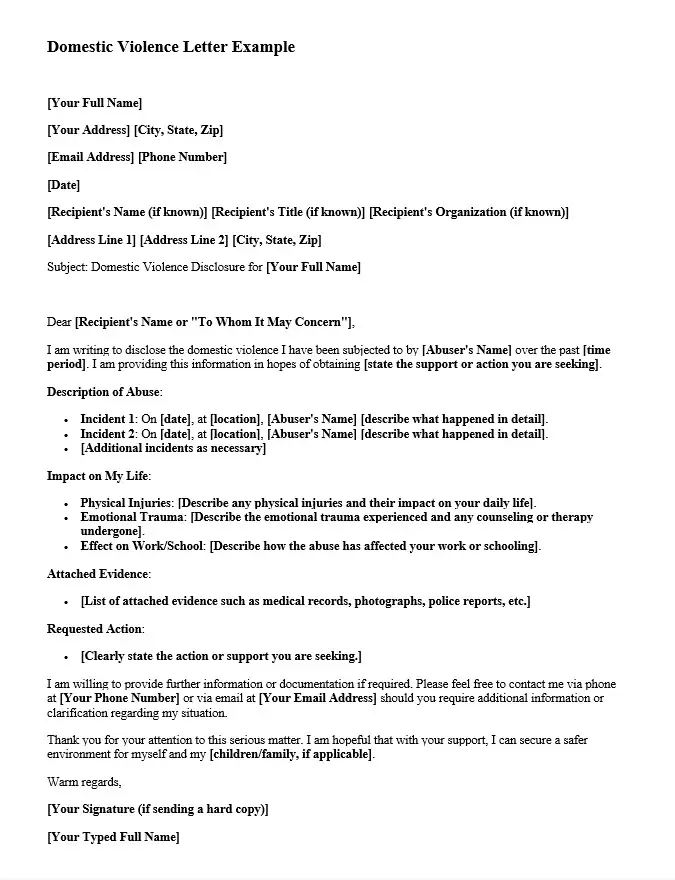
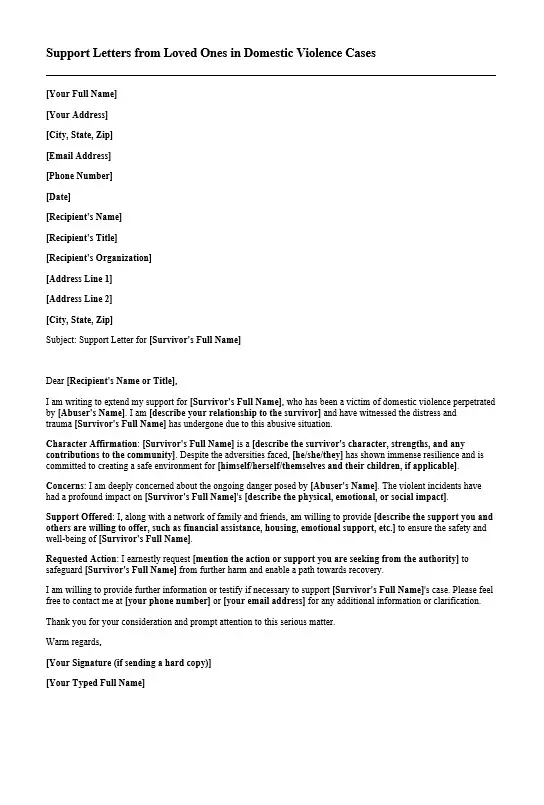
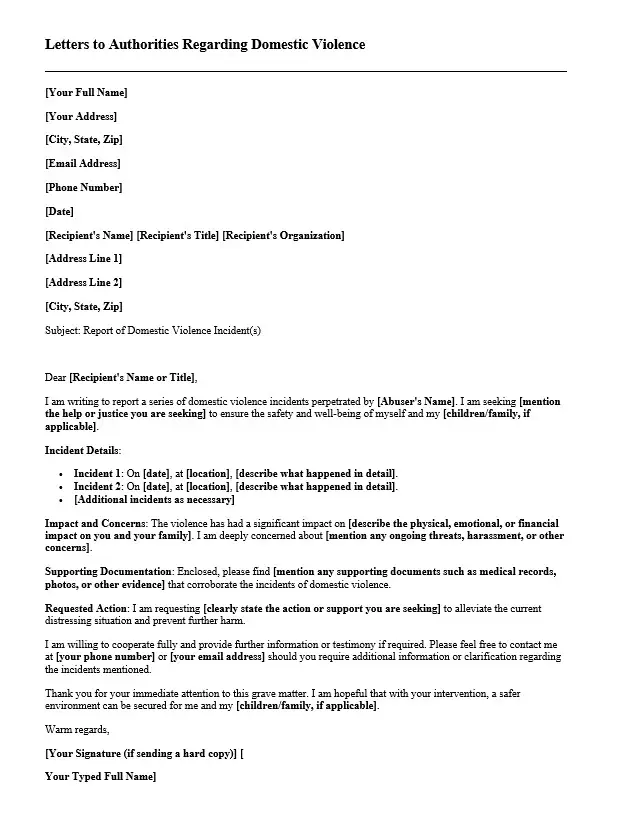
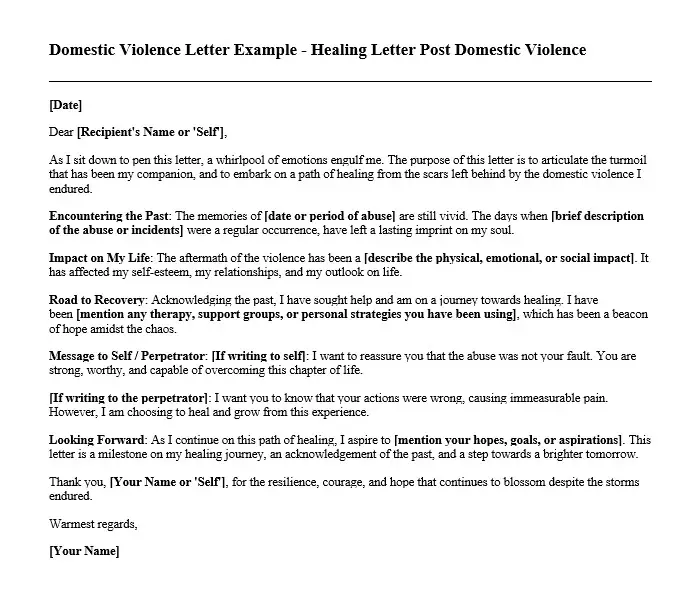
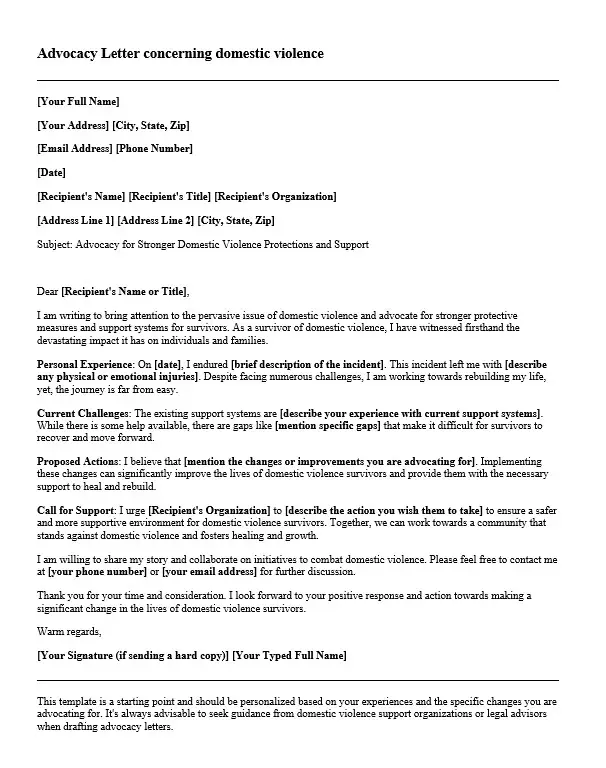
Can a Domestic Violence Letter be used in court?
Yes, these letters can be used in court to show the judge what happened and why the hurt person needs protection or help.
To whom should It send a domestic violence letter?
It depends on the type of letter:
- Advocacy letters can be sent to lawmakers, local newspapers, or community leaders.
- Healing letters are often personal and may not need to be sent.
- Letters to authorities should be sent to local law enforcement or legal professionals.
- Support letters should be sent to the individual needing support.
Where to Send a Domestic Violence Letter
A Domestic Violence Letter is a strong tool to get help and protection when someone is being hurt at home. Where this letter is sent is very important. Here are some places where a Domestic Violence Letter can be sent:
Legal Authorities:
- Courts: The letter can be used in court to explain what is happening.
- Lawyers: A lawyer can use the letter to understand better and help with the case.
Support Organizations:
- Domestic Violence Shelters: They can use the letter to understand the situation and offer a safe place to stay.
- Counseling Centers: They can provide counseling and other help.
Medical Professionals:
- Doctors and Hospitals: They can use the letter to understand the medical help needed.
Educational Institutions:
- Schools and Colleges: They can understand and provide support like counseling or safety plans.
Workplace:
- Employers or Human Resources: They can understand the situation and provide support like time off or a safe work environment.
Government Agencies:
- Social Services: They can provide different kinds of help and support.
- Housing Authorities: They can help in finding a safe place to live.
Law Enforcement:
- Police Departments: They can take action to provide protection and investigate the situation.
Online Platforms:
- Legal Aid Websites: They can guide what steps to take next.
How to keep privacy when writing or sending a Domestic Violence Letter?
When writing a Domestic Violence Letter, privacy is like a shield. It keeps the person who was hurt safe. Here are steps to make sure privacy is kept:
Don’t Share Too Much:
- Only write what’s needed to show the problem. Don’t share too much personal info.
Use Initials or Codes:
- Instead of full names, use initials or codes for people and places.
Keep Copies Safe:
- Keep any copies of the letter in a safe place where others can’t find them.
Send It Safely:
- When sending the letter, make sure it’s sent safely and to the right person.
Talk to a Helper:
- Talk to a lawyer or helper to make sure the letter is written and sent safely.
Use Safe Contacts:
- Only share contact info that is safe to use and won’t lead the bad person to the victim.
Check Laws and Rules:
- Know the laws and rules about privacy to make sure the letter is written right.
Be Careful Online:
- If using a computer, make sure to delete copies and clear history so others can’t see.
Keeping privacy is very important in making sure the person who was hurt stays safe. Following these steps can help keep the letter private and the person safe.

The content creator team at calipsotree.com is dedicated to making topics accessible to everyone, with over 9 years of experience in writing and breaking down complex concepts into easy-to-understand articles that answer readers’ financial questions.








